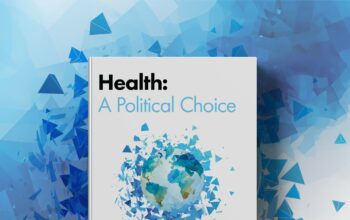Africa’s Vaccine Manufacturing for Health Security Conference – Our top 5 messages on expanding manufacturing in Africa
On April 12 and 13 the African Union and the African CDC organized Africa’s Vaccine Manufacturing for Health Security virtual conference, opened by HE Moussa Faki Mahamat, Chairperson of the African Union Commission and chaired by HE Félix Antoine Tshilombo Tshisekedi, Chair of the African Union and President of the Democratic Republic of Congo. Over the course of the two-day program, nearly 90 speakers, and over 40,000 cumulative attendees joined various platforms from over 100 countries. The event concluded with two major partnership announcements with the African Union in support of strengthening vaccine manufacturing initiatives in Africa. Thomas Cueni, IFPMA’ Director General represented the research-based pharmaceutical industry on the panel on intellectual property transfer.
So what 5 messages did we share from the event?
Pharma’s role so far
The pharmaceutical response to the unprecedented COVID-19 challenge has been truly unprecedented. After developing several vaccines in record times, vaccine makers both in the developing and developed world did not lose any time in getting the manufacturing capacity up and running to make more vaccines doses than the world has ever produced before. They have done so by further developing technologies that have been researched for years and agreeing upon collaborations and investments in record time to start expanding manufacturing.
Whilst there has been unprecedented progress there is still much to do, and unfortunately COVID-19 is not going to go away any time soon. We have seen far too many lives lost and livelihoods destroyed to ease up on the fight now. Africa is key to achieving global herd immunity and as stated several times during the conference, more efficient vaccine manufacturing capacities would benefit the struggle against other diseases on the continent as well.
IP is not the issue
Intellectual property protections are not an obstacle to vaccine production. To the contrary, IP has been the engine that has fueled groundbreaking research and development efforts and has enabled broad collaboration amongst a diverse group of stakeholders including governments, research institutions, and pharmaceutical companies. Thomas emphasized that he is often asked if IP is stopping technology transfer. To the contrary, IP has allowed industry to develop necessary vaccine platforms and in the past year for COVID alone, entered into 272 deals of which 204 are based on tech. He also indicated that there have been bumps on the road as vaccine manufacturing is a complex biological process. None of the problems are IP related but related to scale up issues. Thomas concluded with saying that a TRIPS waiver would bring no practical solutions for manufacturing vaccines in Africa.
A stronger regulatory environment will spur investment
The conference also highlighted the need for greater regional harmonization which could help enable exports and expand market potential.
On the regulatory point it is worth noting that there is no globally harmonized set of requirements for a manufacturer to register a vaccine in a new country. As a result, a company may have to prepare up to 140 different registration dossiers. This is why IFPMA and many stakeholders in global health involved in increasing access to medicines and vaccines call for rapid ratification of the Africa Medical Agency Treaty. Numerous participants at the event both public and private echoed these calls for ratification.
The launch of the African Continental Free Trade Area and other harmonization efforts by the African Medicines Agency and various regional organizations are steps in the right direction but building a stronger environment for investment will require a long-term approach and there will be a need to continue work on this front after COVID-19. Mr Solomon Quaynor Vice President, Private Sector, Infrastructure and Industrialization, African Development Bank Group, Côte d’Ivoire stated that these efforts will simplify local African manufacturing and technology and R&D transfers, allowing the emergence of more partnerships.
Financing is key
There needs to be a multi-stakeholder approach, which in addition to the private sector, will include global financial institutions, governments, donors, etc. that can help derisk investments and provide a more long-term approach.
There needs to be a multi-stakeholder approach, which in addition to the private sector, will include global financial institutions, governments, and donors that can help derisk investments and provide a more long-term approach.
Public–private partnerships and joint ventures should also be encouraged and other nontraditional financing methods should also be explored.
Skills development is required
Vaccine manufacturing requires a significant number of technical skills including technical knowledge of regulatory affairs and quality assurance. As noted during the conference, by Stéphane Bancel, Moderna CEO, one of the biggest challenges we are facing today is that human resources are running flat out and perhaps we are pushing our teams too far.
That is why it is important to invest now in the development of these skills locally in Arica. COVID-19 has galvanized the development of indigenous innovations: innovators on the continent have responded with a wide range of creative inventions suited to address local challenges.
This is why, via our IFPMA Africa Young Innovators Health Award, we provide young African entrepreneurs in the healthcare sector an opportunity to develop their business ideas and advance promising solutions. We want to invest in the human capital of Africa’s promising young entrepreneurs. We are looking forward to support the award winners with financial resources, as well as business mentorship and expert support, and advice on intellectual protection.
This is a marathon not a sprint
The African Union announced that the goal would be to manufacture vaccines at five research centers to be built on the continent within the next 15 years and South African President Cyril Ramaphosa said the medium-term strategy should be to expand existing manufacturing facilities into regional hubs.
The Coalition for Epidemic Preparedness Innovations (CEPI) and the African Union Commission has announced the signing of a Memorandum of Understanding, which aims to strengthen ties between the organizations and the Africa CDC to enhance vaccine R&D and manufacturing in Africa.
It also makes sense to develop a pan-Africa vaccine manufacturing capacity strategy that will set the continent on course to build an African resilient knowledge based pharmaceutical industry over the medium term. These are not new ideas, but need a renewed focus now, given the situation we are in.
The virtual conference was a powerful and passionate call for action at African level. Like many, we hope at IFPMA, that this will lead not only towards sustainable local production but to overall major political commitment and major investment for health security and health systems on the Continent.
Author






